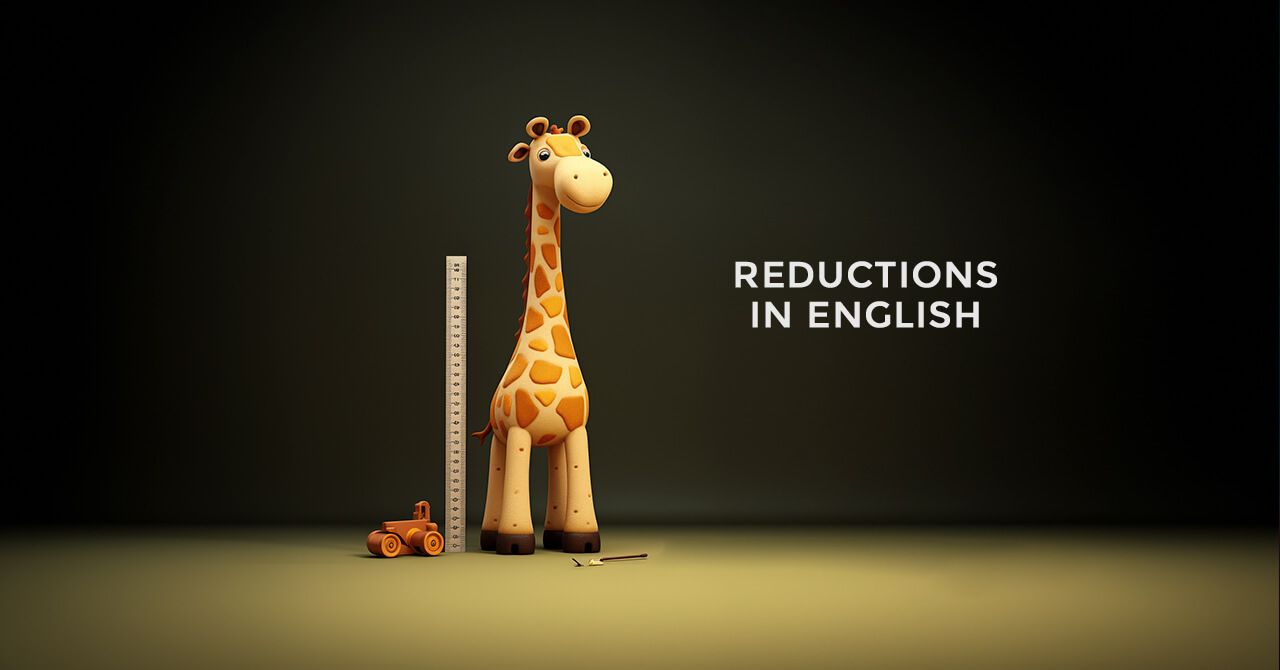
Learning Reductions in English: The Way Natives Speak
Reductions are reduced forms of English words, such as gonna, gotta, wanna, etc. You need to use reductions in order to sound more natural. They are crucial for you to understand native English speakers cause they are common in everyday situations, especially in a more informal context.
Going to > gonna
As you can see, “going to” is reduced to “gonna.” It’s like “will.” Always add a verb after “gonna” and all the verbs below.
I’m gonna work until late today since there’s a lot to be done.
What are you gonna do today?
Want to > wanna
Do you wanna go with us?
They wanna study English because they’re gonna travel abroad next year.
Got to > gotta
The pronunciation of “double t” changes to “r” (ex: gára).
I gotta learn as much as I can.
You gotta believe that you can do anything you dream of.
Have to > hafta
I hafta go now cause my train leaves soon.
They hafta get here on time for the meeting.
Has to > hasta
She hasta stay with her parents for a while.
He hasta be in charge of the project.
Would have > wouldah
The pronunciation of the “d” changes to “r” (ex: wuurah for Brazilians).
I wouldah eaten all the pizza if I was hungry.
They wouldah arrived earlier, but they got stuck in traffic.
Could have > couldah
We couldah helped you but you did it all by yourself.
He couldah handled the project better with more time. (ex: kuurah for Brazilians)
Should have > shouldah
I shouldah studied more for the test, not sure if I will get it.
She shouldah gone with them to the park. (ex: shuurah for Brazilians)
Must have > musta
She musta been really tired since he’s been working overtime.
You musta had some problems with delivery this month.
Let me > lemme
If you lemme go with you, I’ll buy you ice cream.
Lemme introduce my friend to ya.
Give me > gimme
Can you gimme a hand with these bags, please?
Gimme a moment, please, I’m busy with a customer on the line.
Trying to > tryna
I’ve been tryna learn English for a long time.
She’s been tryna to call her parents, but they don’t seem to be at home.
Front of > frunna
I’ll be waiting for you in frunna the building.
He’s been waiting outside in frunna the school for months.
Lot of > lotta
I have a lotta work to do, I’m behind schedule.
There are a lotta people coming to the festival.
Kind of > kinda
I kinda know how to play chess, but I need more practice.
What kinda movies do you like watching?
Out of > outta
I’ll be outta work in two hours. Could you pick me up?
If we don’t act now, the situation will get outta control.
Type of > typa
What typa music does she listen to?
He’s the typa person who likes taking solo trips.
Get you > getchew
I need to getchew to understand the lesson.
Don’t worry, I’ll getcha outta here.
Don’t you > doncha / donchew
You really like Mexican food, donchew?
Doncha think that if you believe, you can do whatchew want?
Did you > dijew
Dijew hear the news about the latest Spider Man?
I didn’t understand today’s math lesson, dijew?
What do you > whaddaya / whatcha
Whaddaya like doing on the weekend?
Whatcha think of my new shirt?
What are you > whaddaya / whatcha
Whaddaya doing weirdo?
Whatcha talking about? I can’t get it.
What is up > whassup / sup
Hey buddy, whassup?
He looked in the mirror and said: Sup?
What is his > whatsis
Whatsis main concern about the job?
Whatsis favorite type of music?
What is her > whatser
Whatser idea is all about?
They asked the boy: Whatser adress?
Don’t know > dunno
I dunno where he gets it all from.
I dunno where we are supposed to go.
Tell her > teller
The manager asked you to teller that he will be out for the week.
If my sister calls me, teller I’m not here.
Tell him / them > tellem
I need you to tellim that if he wants, he can come to the party.
She’ll tellim that you’re gonna have to leave early.
Told her > tolder
I tolder everything you asked me to.
The boss tolder that she was the new manager.
Told him > toldim
I’ve toldim lots of times that if they wanna go, they can.
He toldim the truth about what happened.
To them > to ‘em
She said to ‘em that visiting Korea is an incredible experience.
The email has been sent to ‘em already.
I’m going to > Ima / I’m unna
Imma have to go to the gym alone since my friend isn’t able to.
Ima tell ya why they’re struggling with pronunciation.
Hi there! Thanks for reading my articles. I’m passionate about English. I’ve helped students on getting more confidence when talking to natives.

